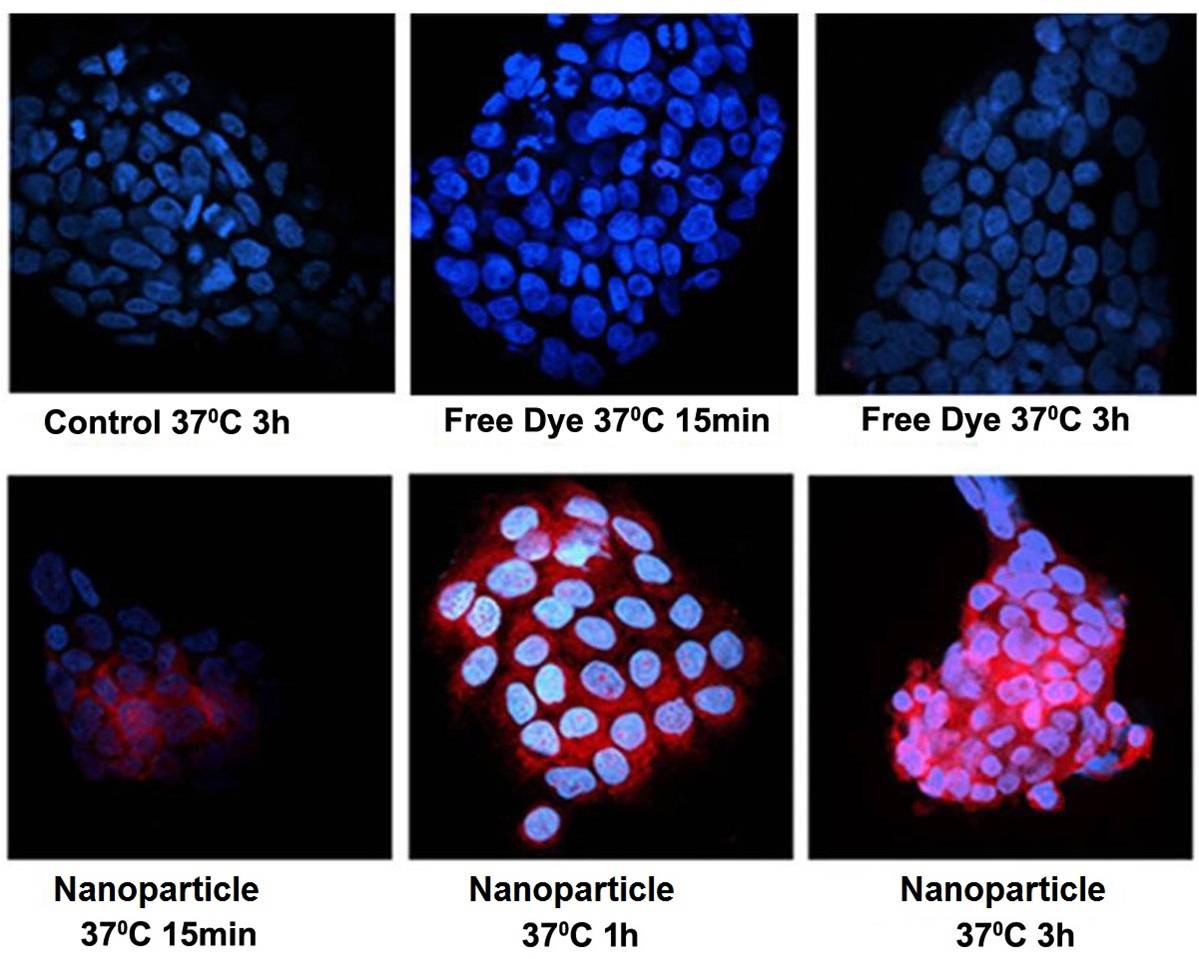Anti-inflammatory luteolin concentrated in nanocapsules in the blood inhibits lung-cancer growth
January 9, 2014

Cellular uptake of nanoparticles encapsulating both dye and luteolin (credit: Winship Cancer Institute of Emory University)
The study, published in Cancer Prevention Research, involved the use of microscopic amounts of the naturally occurring antioxidant, luteolin, that were encapsulated in a water-soluble polymer. When injected into mice, the nano-luteolin inhibited growth of lung cancer and head and neck cancer cells.
“By using a high concentration of luteolin in the blood, we were better able to inhibit the growth of cancer cells,” says senior study author Dong Moon Shin, MD, professor of hematology and medical oncology at Emory University School of Medicine and associate director of academic development at Winship Cancer Institute.
Luteolin is known for its anti-inflammatory and anti-cancer effects. It is naturally found in green vegetables such as broccoli, celery and artichokes, however, Shin says large quantities would need to be consumed to be effective. By concentrating the compound into a nanoparticle and making it easy to dissolve in water, researchers conclude nano-luteolin has immense potential for future human studies of chemoprevention (to help stop the recurrence of cancer in patients and reduce the risk of cancer in others).
Shin told KurzweilAI several chemotherapeutic agents using nanotechnology have been developed for drug delivery over the last decade. “As a chemopreventive agent, our nanotechnology-driven delivery would be one of those pioneering ones. The new luteolin chemopreventive agent has to still go through many steps, including GMP production, IND filing, conducting phase I, II, and III trials, etc., so it is hard to predict at this moment how long it will take to be commercialized.”
Abstract of Cancer Prevention Research paper
Cancer prevention (chemoprevention) by using naturally occurring dietary agents has gained immense interest because of the broad safety window of these compounds. However, many of these compounds are hydrophobic and poorly soluble in water. They frequently display low bioavailability, poor systemic delivery, and low efficacy. To circumvent this problem, we explored a novel approach toward chemoprevention using nanotechnology to deliver luteolin, a natural compound present in green vegetables. We formulated water-soluble polymer-encapsulated Nano-Luteolin from hydrophobic luteolin, and studied its anticancer activity against lung cancer and head and neck cancer. In vitro studies demonstrated that, like luteolin, Nano-Luteolin inhibited the growth of lung cancer cells (H292 cell line) and squamous cell carcinoma of head and neck (SCCHN) cells (Tu212 cell line). In Tu212 cells, the IC50 value of Nano-Luteolin was 4.13 μmol/L, and that of luteolin was 6.96 μmol/L. In H292 cells, the IC50 of luteolin was 15.56 μmol/L, and Nano-Luteolin was 14.96 μmol/L. In vivo studies using a tumor xenograft mouse model demonstrated that Nano-Luteolin has a significant inhibitory effect on the tumor growth of SCCHN in comparison to luteolin. Our results suggest that nanoparticle delivery of naturally occurring dietary agents like luteolin has many advantages and may have potential application in chemoprevention in clinical settings. Cancer Prev Res; 7(1); 65–73. ©2013 AACR.
(¯`*• Global Source and/or more resources at http://goo.gl/zvSV7 │ www.Future-Observatory.blogspot.com and on LinkeIn Group's "Becoming Aware of the Futures" at http://goo.gl/8qKBbK │ @SciCzar │ Point of Contact: www.linkedin.com/in/AndresAgostini
 Washington
Washington